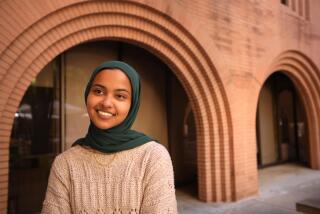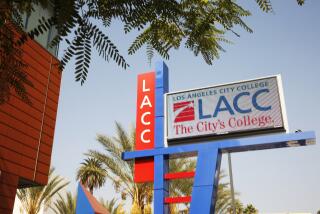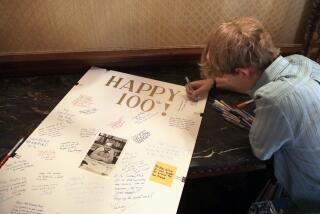A Study in Achievement and Balance
- Share via
Winning a Rhodes scholarship isn’t what you might imagine. There is no breathless waiting near the phone. The committee says yes or no within hours of your final interview. And there is no wondering if you will be academically good enough to sustain it. Barring misbehavior, the scholarship entitles winners to study at Oxford University in England for up to three years after they graduate from college, with all tuition and living expenses paid.
And there is no question of what the scholarship will mean to your passage through life. Aside from the obvious benefits of an education at one of the most prestigious universities on the planet, the mere fact that a person is named a Rhodes scholar forever adds luster to his or her name.
“Winning a Rhodes scholarship is one of the few things you can do at 22 [that] they will chisel on your tombstone,” a former winner once told the New York Times.
That said, it’s no wonder that several thousand American college seniors try for the honor every year, knowing that only 32 of them can win.
When this year’s Rhodes scholars were selected in December, it was an unexpected Christmas present to these four outstanding California students.
*
Eugenio Fernandez, 20, grew up and went to schools in Pasadena, then to college at Notre Dame. He will graduate in May with a double major in philosophy and theology and an “accidental major” in classical languages (Latin, Greek and Hebrew).
But is he a total bookworm? Heck no. Fernandez plays basketball, coaches junior baseball, ministers to the sick and poor, teaches kids their catechism, and lives in a Catholic seminary on campus because he has “always felt a calling to become a priest.”
Impressive as all that is, a few minutes on the phone with Fernandez reveals that his ambitions are even more so.
“Most of the great social and political problems in the world today stem from the absence of traditional ethics, which have ruled human behavior since Aristotle and which have only recently been abandoned,” Fernandez says.
“We have switched from virtue-based ethics to a raging ethics-of-consequences. That’s why there is such great moral confusion.”
He’d like to help change that, he says, so he’ll study classical ethics at Oxford, after which he plans to serve as an advocate for “people who can’t speak for themselves, the defenseless and the forgotten.” To be just an academic or a priest is “not nearly enough,” he says. “I want to actively help humanity.”
Fernandez’s mother manages a Sanwa bank in Altadena. His father is comptroller for a clothing company. Fernandez had never thought of a Rhodes scholarship for himself until three months before he won, when the dean of his school suggested he apply. “I thought it was too high an honor for me to even consider,” he says.
That is exactly the kind of person Cecil Rhodes apparently had in mind when he set up his scholarship in 1903. Righteous but humble. Brainy but well-rounded. Worldly but not superficial or self-obsessed. The sort of person, Rhodes said, who might become a prime minister or president.
Until President Clinton, no American Rhodes scholar had fulfilled that particular part of Rhodes’ dream. (Jimmy Carter applied but was not chosen.)
Rhodes himself began life as the sickly son of an English clergyman. Sent to South Africa for his health, he grew to become a vigorous athlete and adventurer, a self-made millionaire, and a respected member of Cape Colony’s parliament as well as its prime minister. Eventually, Rhodes changed the face of Southern Africa by merging the huge diamond mining companies of Kimberley and De Beers, and by opening up for development a region that would later be called Rhodesia and then Zimbabwe.
More than anything else, Rhodes dreamed of bestowing his vast wealth on carefully chosen men (women were excluded until 1975) who would spend their lives helping humanity long after his own death. To equip them for the task, he decided to offer an all-expenses-paid education at Oxford to “prepare them for the world’s fight.”
*
Benjamin Jealous, 23, of Pacific Grove, in the Monterey area, finished his undergraduate work in political science at Columbia University in July after a somewhat checkered academic career. In fact, Jealous didn’t think he had a shot at the Rhodes, he says, since he’d been “almost suspended” from the university for organizing protests against a proposed change in its financial aid policy.
And then, in 1993, after a six-week trial, he was suspended for organizing sit-ins that obstructed the entrance to the school. Those sit-ins were in response to Columbia’s announcement that it would tear down the university-owned Art Deco Audubon Ballroom in Harlem, he says.
“The Audubon was architecturally significant. It was also where Marcus Garvey held his meetings and where Malcolm X was assassinated. We tried to force [Columbia] to accept the federal government’s offer to make the building a historical landmark. The school refused. So we held the sit-in. In the end, we lost that battle.”
He stayed out of school for three semesters, during which he organized students in Mississippi to oppose the governor’s plan to close two of the state’s three public, historically black colleges. He says the schools were kept open as a result, although the decision is being appealed.
Back at Columbia, he participated in soccer, judo, softball, volleyball and rowing. And he co-founded the Harlem Restoration Project Youth Corps, which employs student volunteers to restore low-income housing in Harlem and to provide free child care to tenants. It has become the largest community service group on the campus, he says.
Jealous was shocked when he became one of 14 finalists from 100 schools in the New York area. And shocked again when he became one of three sent to the regionals, with candidates from four states. From the 10 chosen there, he was one of four winners.
“The joy of this thing is that it gives me time out before I burn out. Until now, I’ve had to work 30 hours a week to afford school. Now I can study and think full time. I want to formulate a strategy on how to become a new kind of leader.”
He grew up in Pacific Grove, where his father is a counselor and his mother is a marriage and family therapist. Jealous says he absorbed his activist attitudes from them.
*
Daniel Phillip Kim, 21, of Agoura first heard of the Rhodes scholarship while he was at Agoura High School. But he had “no inkling” that people in the arts could apply.
“I thought it was for future national leaders, political types like Clinton.”
Kim is a performing musician and composer whose instrument of choice is the oboe. At 16, he became the youngest member of the Los Angeles Philharmonic Institute. He was a member of the Debut Orchestra of the Young Musicians Foundation of Los Angeles and the American Youth Symphony.
At Harvard, where he’ll graduate in June, he studies history and literature while winning “a lot of research grants” in such subjects as American transcendentalism and African American music. And during school breaks, he tours Asia with the five-person International Winds ensemble, whose founding member is the principal clarinet of the Vienna Philharmonic. He has performed with Yo-Yo Ma, the renowned cellist, who is also a Harvard graduate.
“I remember we discussed why we came here to school,” Kim says. “Music for us meant more than practicing six hours a day. Music is playing football in [Harvard] Yard, having late night conversation, reading great books, having brilliant professors and classmates. That’s what will give you the life that actually creates music.”
Unconsciously a follower of Rhodes’ prescription for human excellence, Kim was also a director of the homeless shelter in Harvard Square, the only such student-run facility in the U.S. He plays tennis, sails, was captain of an intramural soccer team and believes he has a “responsibility to be a spokesperson for the arts in the community.” He served the Massachusetts Senate as advisor on arts policy and helped win legislation to include the arts in the state’s education curriculum. He is a National Merit scholar and a Robert Byrd scholar.
Kim says he would not have won the Rhodes award if he had been thinking about winning it instead of “just living my life.”
Kim’s father is a nuclear engineer for Rockwell; his mother is a computer program analyst.
*
Annette Salmeen, 22, an Olympic gold medal swimmer, is a chemistry major at UCLA, where she will graduate in June. For her, winning the Rhodes was no different than winning the gold. Both took immense persistence and dedication, she says.
“It’s been very much like a ladder,” she says of her swimming experience. “One step at a time, from city to state to national levels. I’ve been swimming since I was 8.”
As for the Rhodes: “I tried to win it last year and only made it to the state level. So I tried again this year. In between, I’d done another year of research in protein structures at the biochemistry lab, and more community work.”
Salmeen believes she won on the second try because the Rhodes committee was looking for “a balanced person.” Aside from her success in athletics and academics (she’s a member of Mortarboard, the senior honor society), she says she has “a genuine interest” in serving others.
She gives talks frequently at schools, camps and swimming clinics, she says, “to give the kids a role model and let them know they make choices each day, and each one is important.” Salmeen stresses the things she says she learned from her parents and coaches: “They instilled in me a work ethic, always to strive for something that may seem a bit unattainable at the time, but to take little steps toward that goal every day.”
That’s exactly how she approached the scholarship competition, the Olympic contests and every other project in her life. “I’ve learned that I cannot control the outcome. I cannot control others. I cannot control anything but myself. So I just take one step at a time, work hard, persist.”
At Oxford, Salmeen will study molecular biophysics. She plans a career as a researcher and educator, combining the professions of her parents. Her father is manager of the chemistry department at Ford Motor Co.; her mother was a math teacher before she retired to raise a family.






